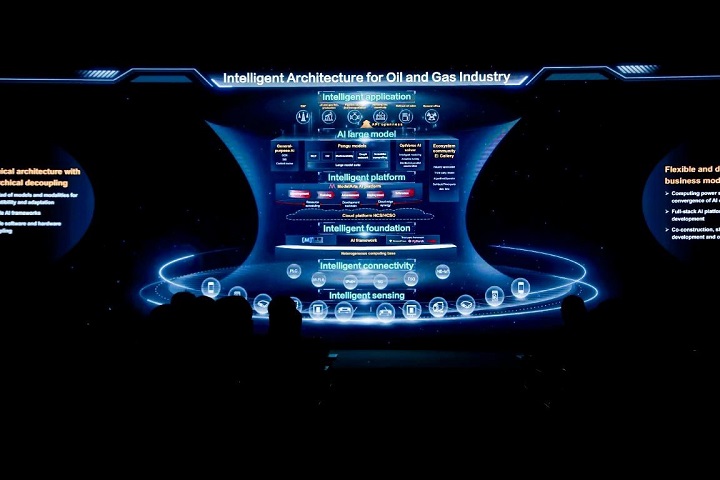Enterprise products, solutions & services
[Shanghai, China, September 20, 2023] At HUAWEI CONNECT 2023, Huawei launched the intelligent architecture and intelligent E&P solution for the oil and gas industry. The digital technology marks a new milestone in intelligent development for oil and gas.
Huawei's intelligent architecture for oil and gas is made up of six intelligent segments: sensing, connectivity, foundation, platform, AI models, and application. Every segment involves hierarchical decoupling. The architecture is compatible with mainstream third-party frameworks and can interconnect with existing or newly built third-party platforms and data lakes.
Huawei divides typical oil and gas scenarios into three types: deterministic professional, complex prediction, and common interaction scenarios. Based on large models, users can take a differentiated approach to emerging intelligent needs. The unified intelligent architecture builds upon what the industry, partners, and Huawei have to offer, and can adapt to all kinds of business models.

E&P is the first step for the entire oil and gas industry chain. Conventional E&P is becoming more and more complex as time goes on. 3D seismic exploration and high-precision processing and interpretation technologies are widespread, which has increased seismic data volume exponentially. Refined E&P research has become the core engine to increase reserves and production. To address this, Huawei's intelligent E&P solution integrates high-performance computing, massive data storage, AI exploration models, and collaborative scheduling of software and hardware resources. New technologies, like storage, high-performance computing platforms, AI, and cloud, help oil and gas enterprises achieve efficient and refined E&P research.
As the original seismic data grows explosively, Huawei's E&P storage solution provides stable, reliable, secure, and high-performance storage devices to house it. It meets the storage performance needs of seismic data processing, interpretation, and reservoir numerical simulation, and shortens routine processing time by 30%.
For many oilfields, E&P data is large in volume and scattered, and the computing power of traditional data centers is nowhere near sufficient. Huawei's E&P cloud solution implements centralized data management and sharing based on the cloud, which allows customers to convert CAPEX to OPEX. The maximum processing area can be expanded from 400 km2 to 2000 km2, and the depth of the stratum that can be processed is increased from 5 km to 8 km, greatly improving seismic processing and interpretation efficiency.
Huawei provides an AI platform that lends services to seismic data processing and interpretation, oil and gas reservoir identification by well logging, and pumping well condition diagnosis. The platform involves data integration, storage and governance, knowledge graph construction, algorithm model development, and general AI services. The overall solution can help oil and gas enterprises quickly build AI platforms. The modeling period of seismic exploration and well logging interpretation can be shortened by 80%, and the accuracy of carbonate fracture and cavern prediction and well logging fluid identification can be boosted higher than 95%. This not only improves the efficiency of exploration and prediction, but also consolidates and passes on expert experience.
For the future oil and gas development, Li Yangming, CTO of Oil and Gas Industry, Enterprise BG, Huawei, said that Huawei will stick to its positioning, fully leverage its full-stack digital technology, be an intelligent bridge builder, and work with customers and partners to make AI tech pervasive.
For more Huawei's oil and gas solutions, click here.